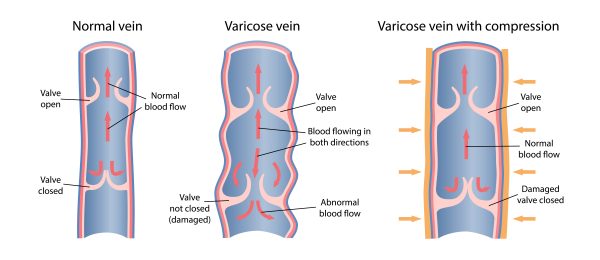Whether it’s plaque build-up from cholesterol, weak vessels from a previous health condition, or any other issue affecting your vein health. For a long time, many medical experts thought that damage to the veins was irreversible. Luckily, there is some good news! Extensive research now shows that it is possible for vein damage to heal. Issues such as vein blockage or damaged venous valves can be repaired and reversed.
Whether it’s through a controlled diet, medication, surgery, or a combination of the three, it is possible to recover at least some of the damage. The below outlines two main types of vein damage: vein blockages and venous valves, and how each is best treated.
Vein damage: blockages
Blocked veins and blood vessels (known as atherosclerosis) occur when plaque builds up on the inner walls of blood vessels in your body. This is mainly caused by excess fat and cholesterol, and creates a narrowing of the blood vessel, making it harder for blood to flow. This can lead to serious health issues, including Stroke, PAD, chronic venous insufficiency and more.
There are several different methods for treating blocked veins, and in some cases, it may reverse part of the damage. It’s best to talk to your doctor or specialist to determine the best course of action for you.
Treatment options for vein blockages:
Lifestyle changes
Making simple lifestyle changes can assist with managing vein damage. Generally, these changes are the most sustainable way to address the condition and will provide the best chance for vein damage to heal.
The following are all examples of lifestyle changes that could have a positive impact on vein health:
- Changing to a diet low in saturated fats, cholesterol, and sugar, and eating more fruit and vegetables.
- Not smoking at all
- Maintaining regular healthy body weight, based on your BMI
- Regular exercise
- Managing stress levels and avoiding stress-inducing situations
- Keeping your blood pressure low
Can surgery heal vein blockages?
There are multiple procedures that specialists can perform to treat blocked veins, including stent placement, bypass surgery and balloon angioplasty. While these can be highly effective, they all carry with them their own risks. You should only consider them after consulting your doctor and getting a second opinion.
Using medication
When working alongside your doctor to treat blocked veins, they may prescribe a range of medications depending on your particular issues. These usually work to lower your cholesterol or blood pressure, while some work to thin the blood and prevent the formation of clots.
Vein damage: venous valves
All blood vessels have valves throughout them, acting to keep the blood flowing in one direction. Venous insufficiency, varicose veins and other health conditions affecting the blood vessels can cause these valves to become damaged and ineffective, leading to poor blood flow and other ongoing conditions. This occurs most commonly in the legs, where the blood can struggle to move back up to the heart. If you are suffering from varicose veins, see Varicose vein treatments.
Read more: Damaged vein valves and how they impact your health.
When these venous valves become damaged, they can sometimes partially repair naturally, but for the most part, they won’t heal themselves. However, this can be addressed through a few different avenues.
Treatment options for damaged vein valves:
Can surgery heal vein valves?
When the damage to valves begins to impair your regular blood flow, often surgery is the most effective method of repairing them. This can be done in several ways, depending on how severe the issue is.
In milder cases, the valve can be repaired under local anaesthetic, by stitching the valve back together or slightly tightening the blood vessel to create a new valve.
In more serious cases, often the procedure needs to occur under general anaesthetic and may require work along the veins.
Lifestyle changes
Changing your lifestyle won’t fully repair the valves, however, it will ease any strain and help improve overall general vein health.
Here are some quick tips to help out your valves.
- Change your diet to more fruit and veggies, and lower cholesterol, fat and sugar.
- Don’t smoke, and moderate any alcohol consumption.
- Exercise regularly, aiming to go for a 30-minute walk each day.
- Wear compression stockings when seated for extended periods of time.
Compression stockings are available from The Vein Institute Shop.
Seek expert advice
The doctors at The Vein Institute specialise in varicose vein treatment. We offer patients a comprehensive program using non-surgical laser treatment techniques. You can learn more in our Definitive Guide to Varicose Vein Treatment.
The benefits of non-surgical varicose vein treatment are:
- Walk-in walk-out treatment
- 98% success rate
- Extremely effective
- Can be performed at a clinic (no hospitalisation)
- No general anaesthetic
- Medicare rebates apply
- No downtime or time away from work
To book a consultation and discuss our treatment program, call 04 2010 2637. Or, make an enquiry via the Contact Us page.






